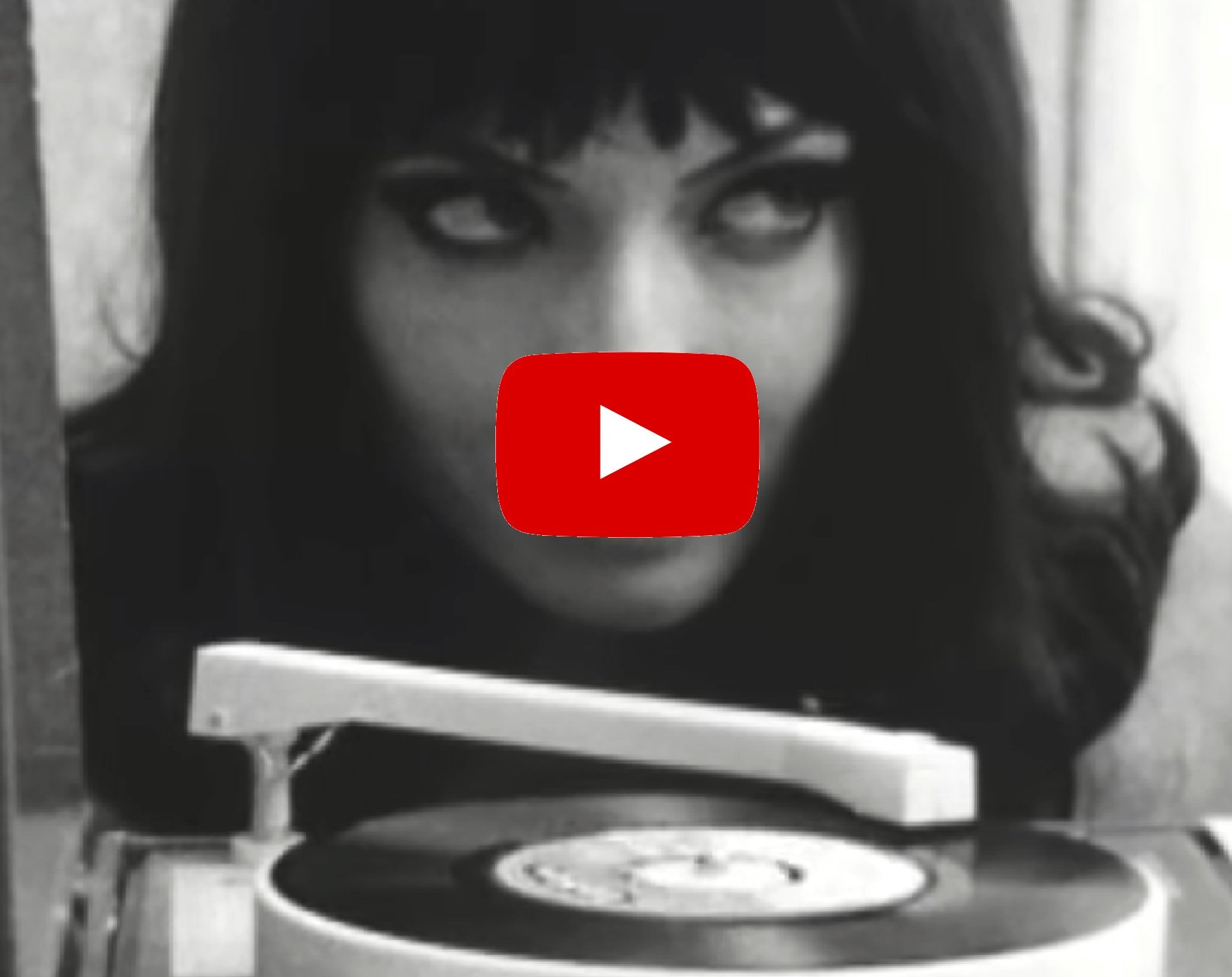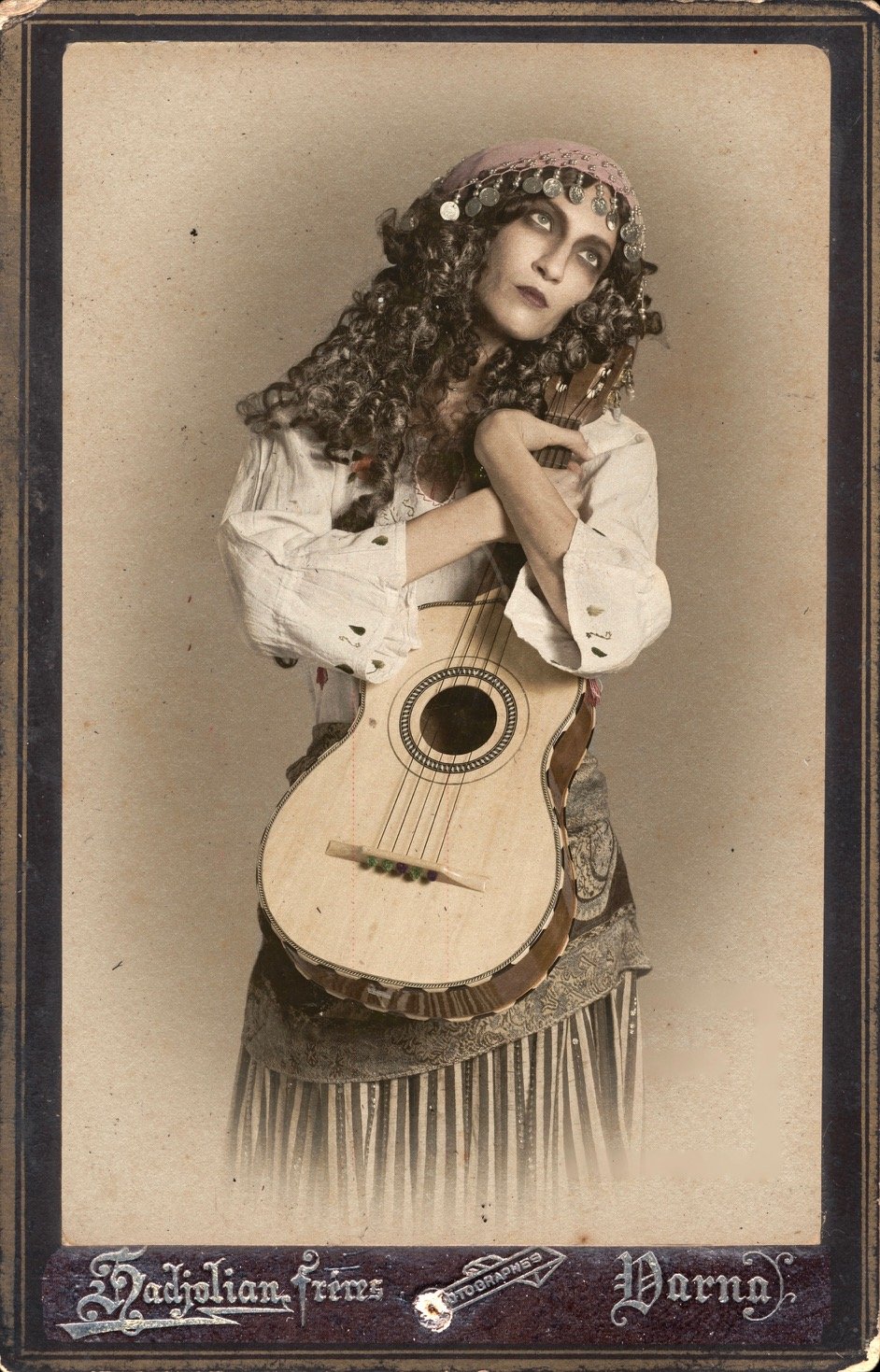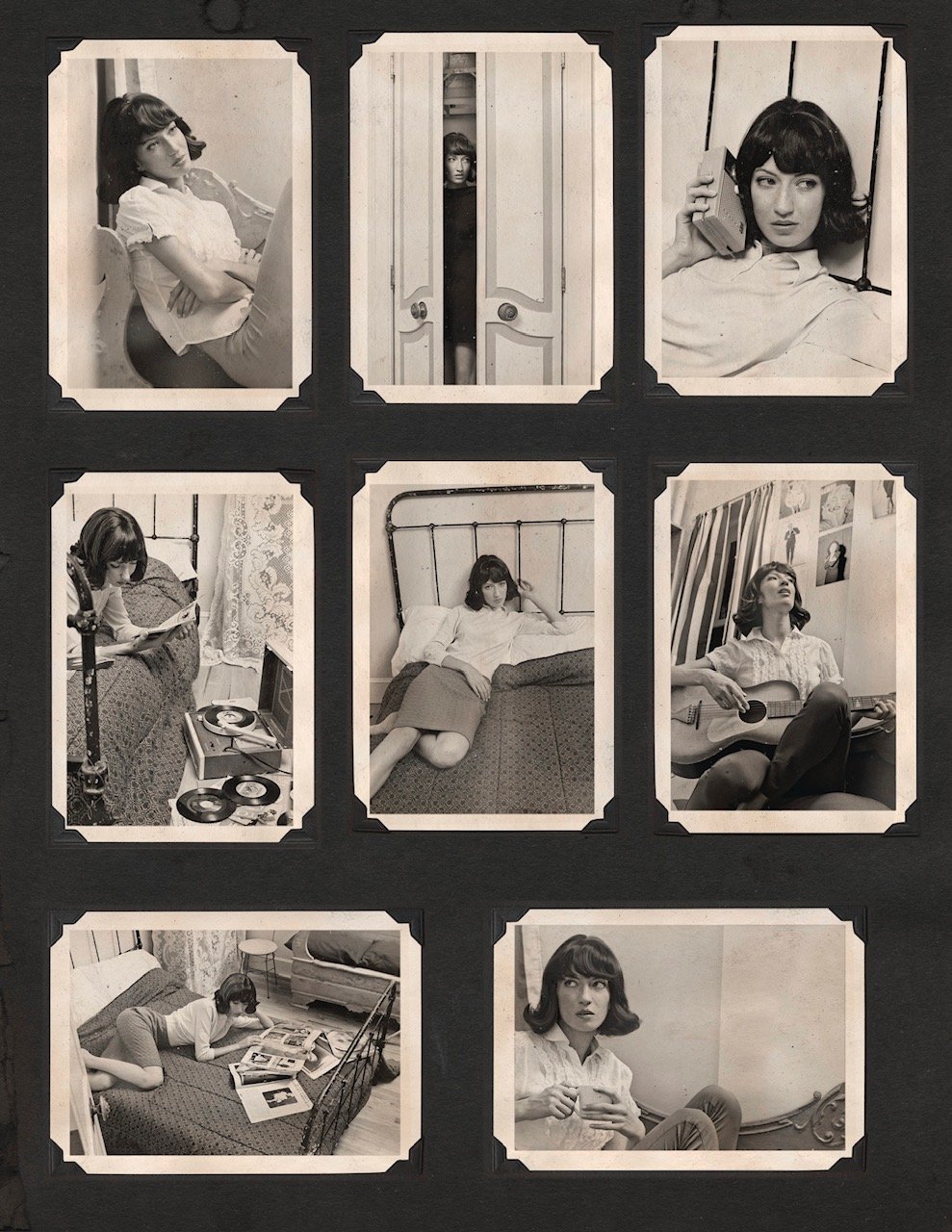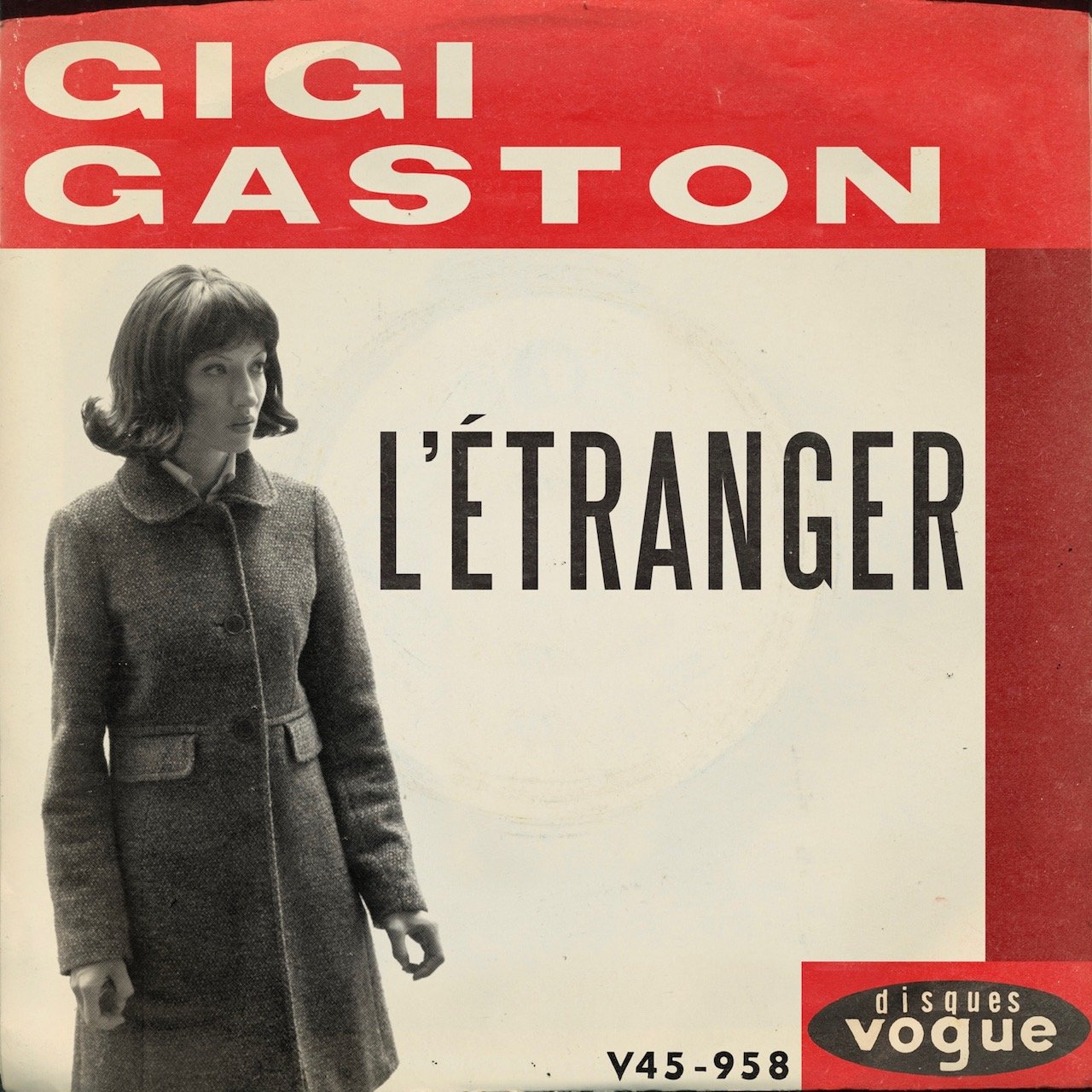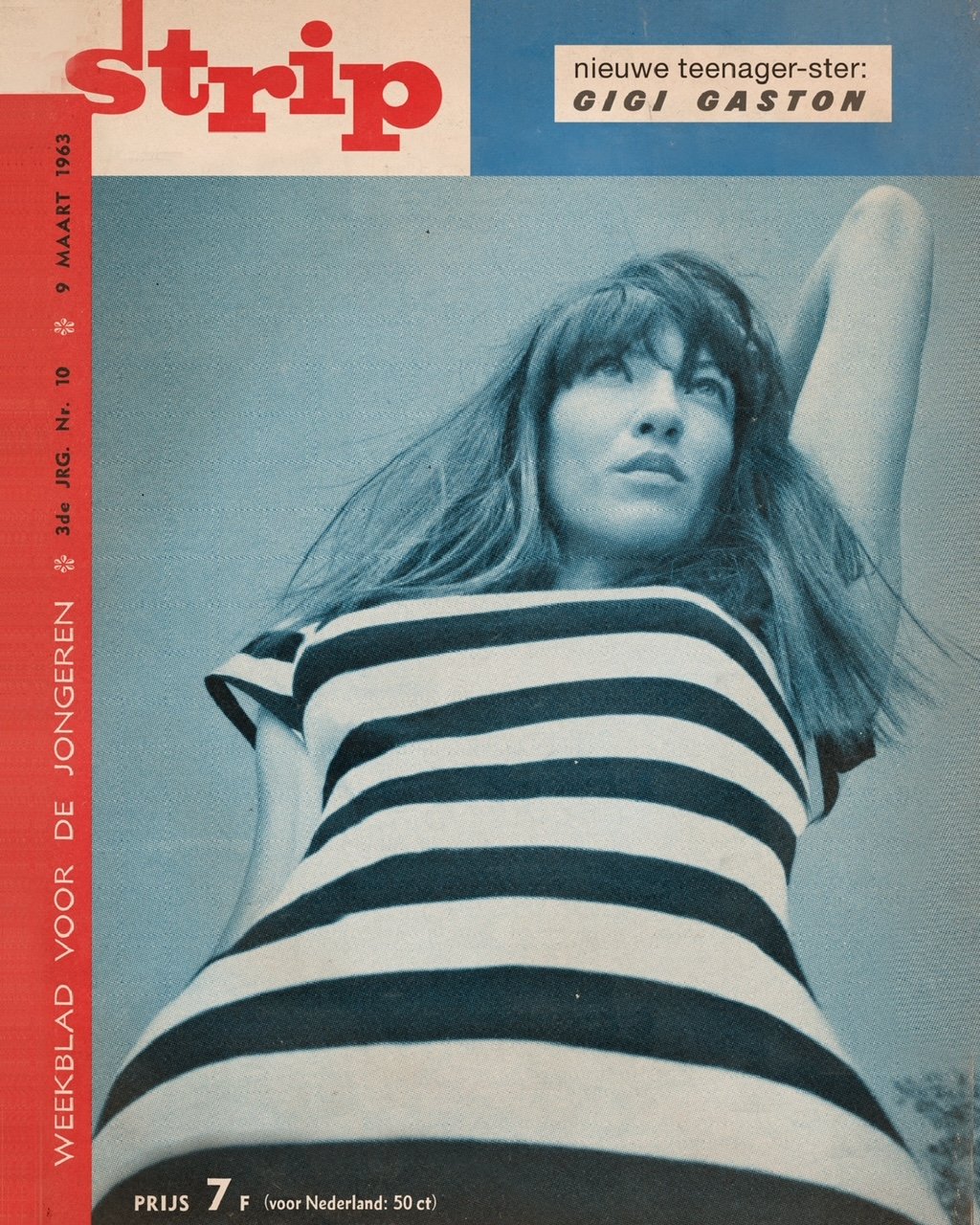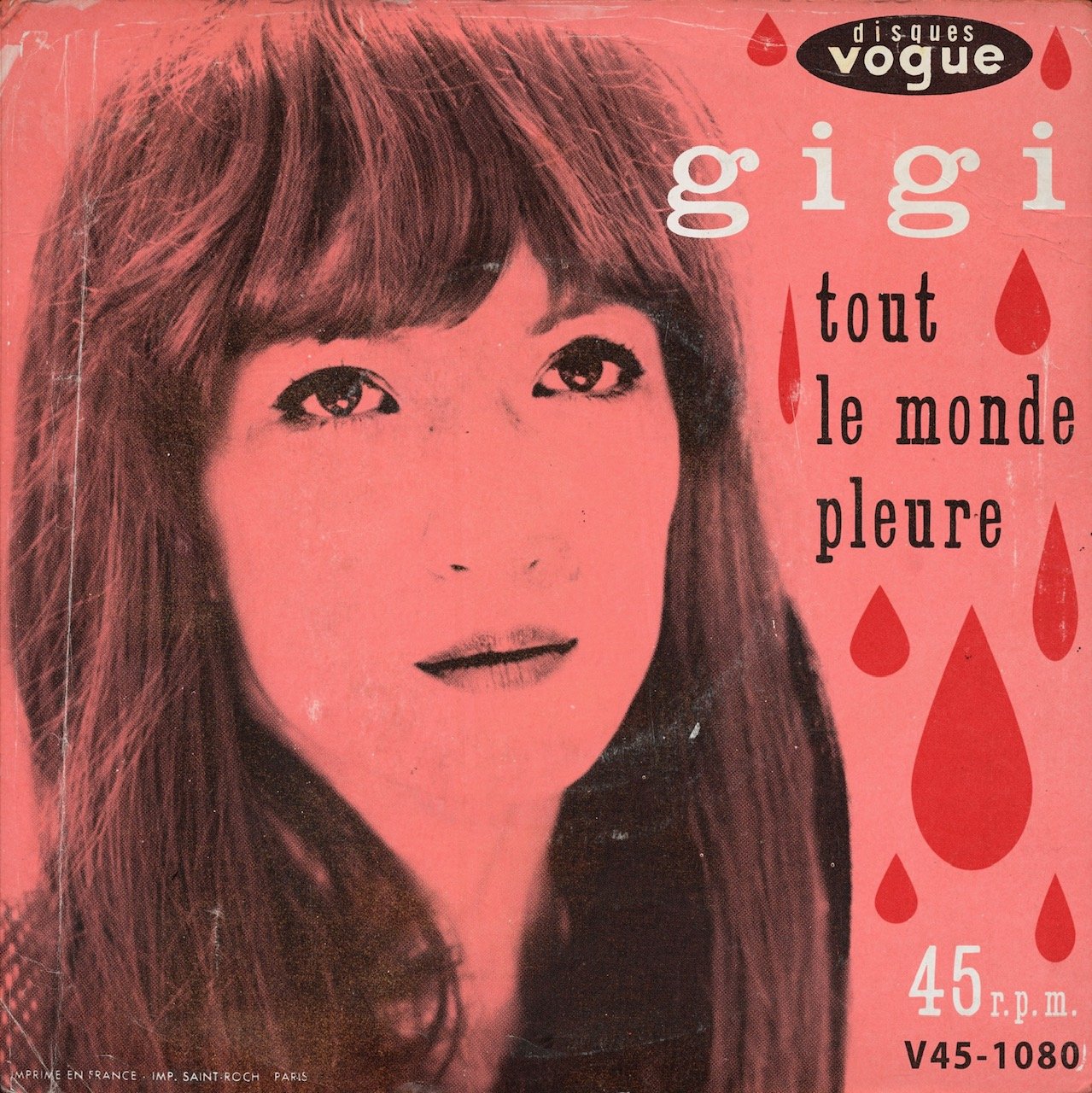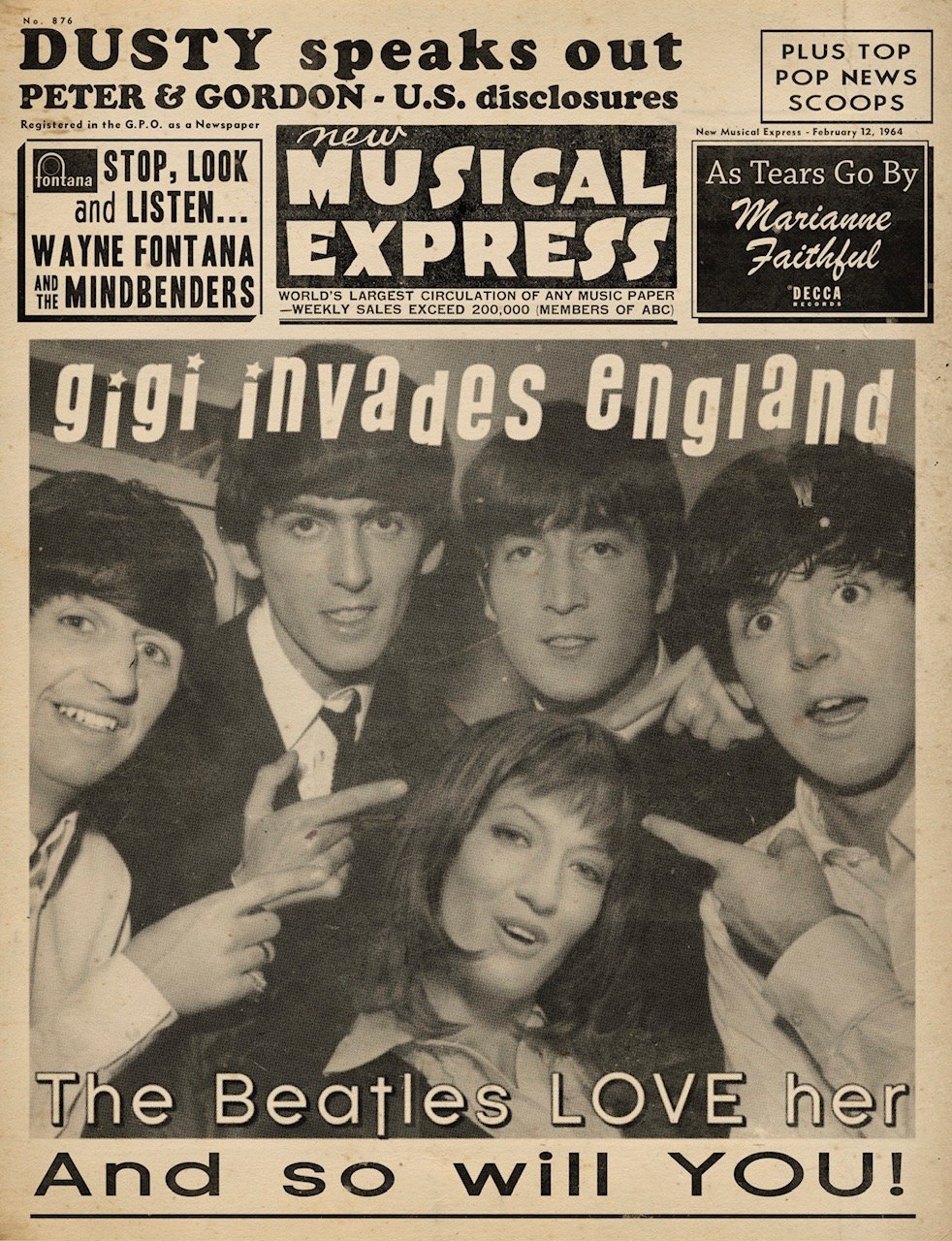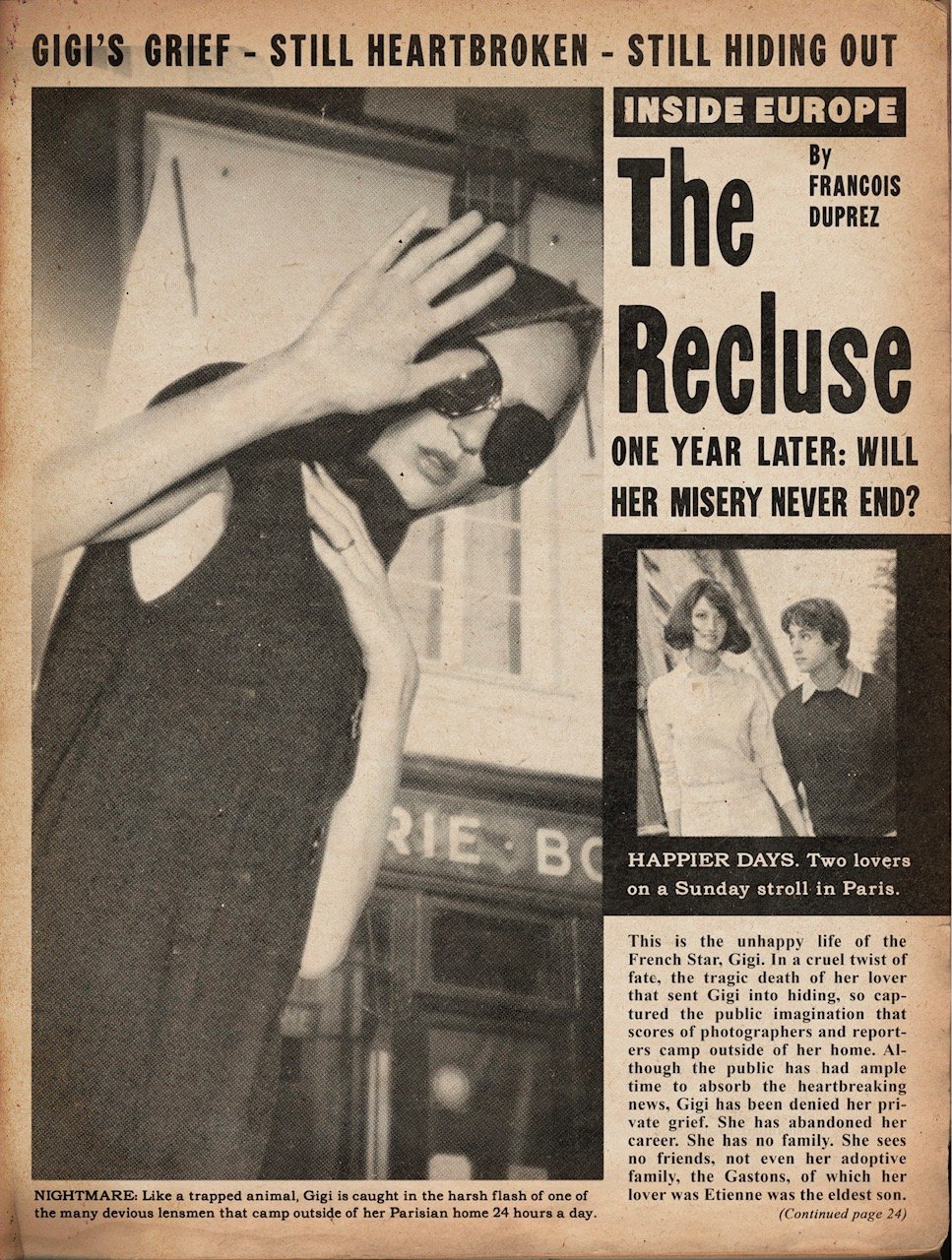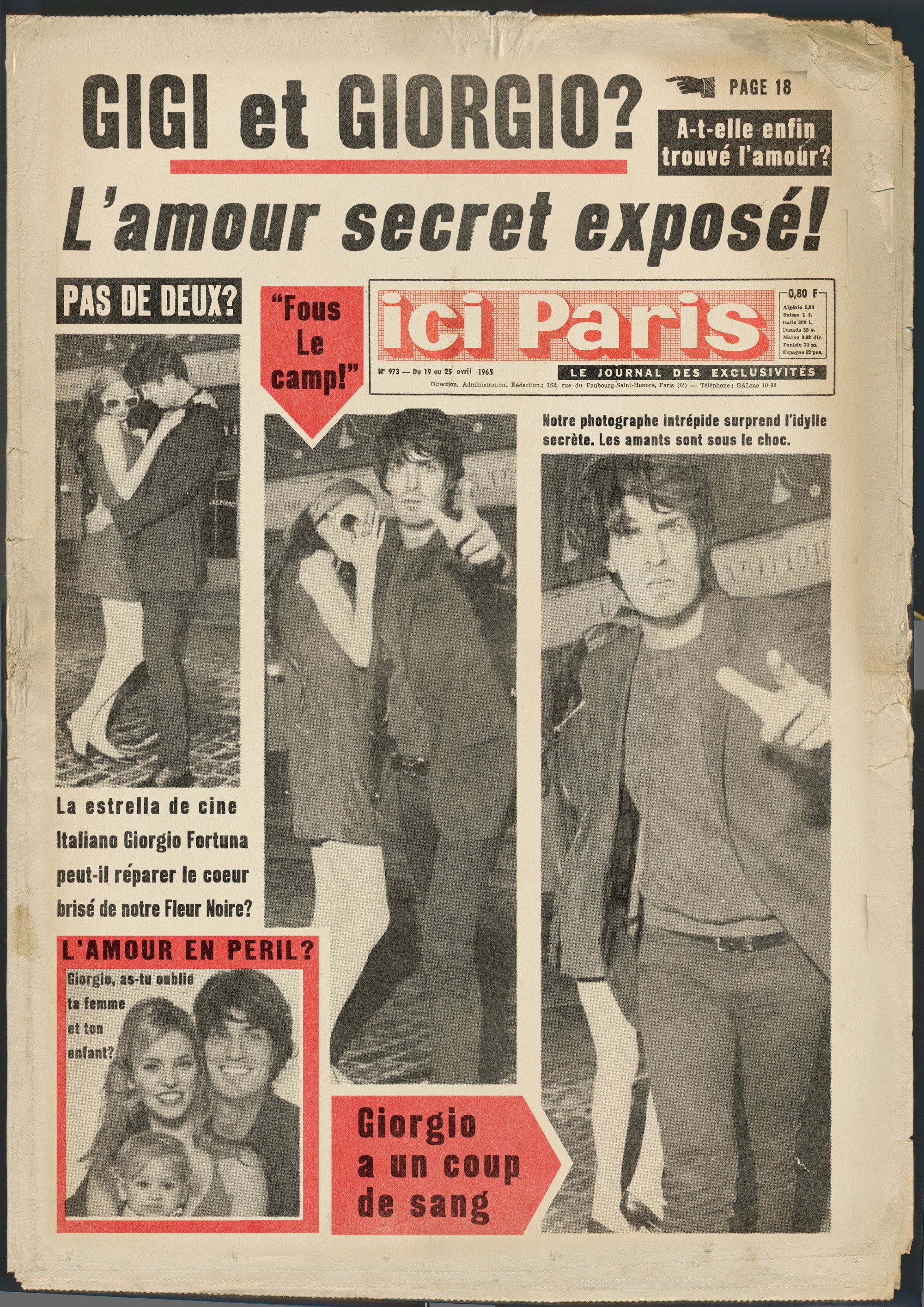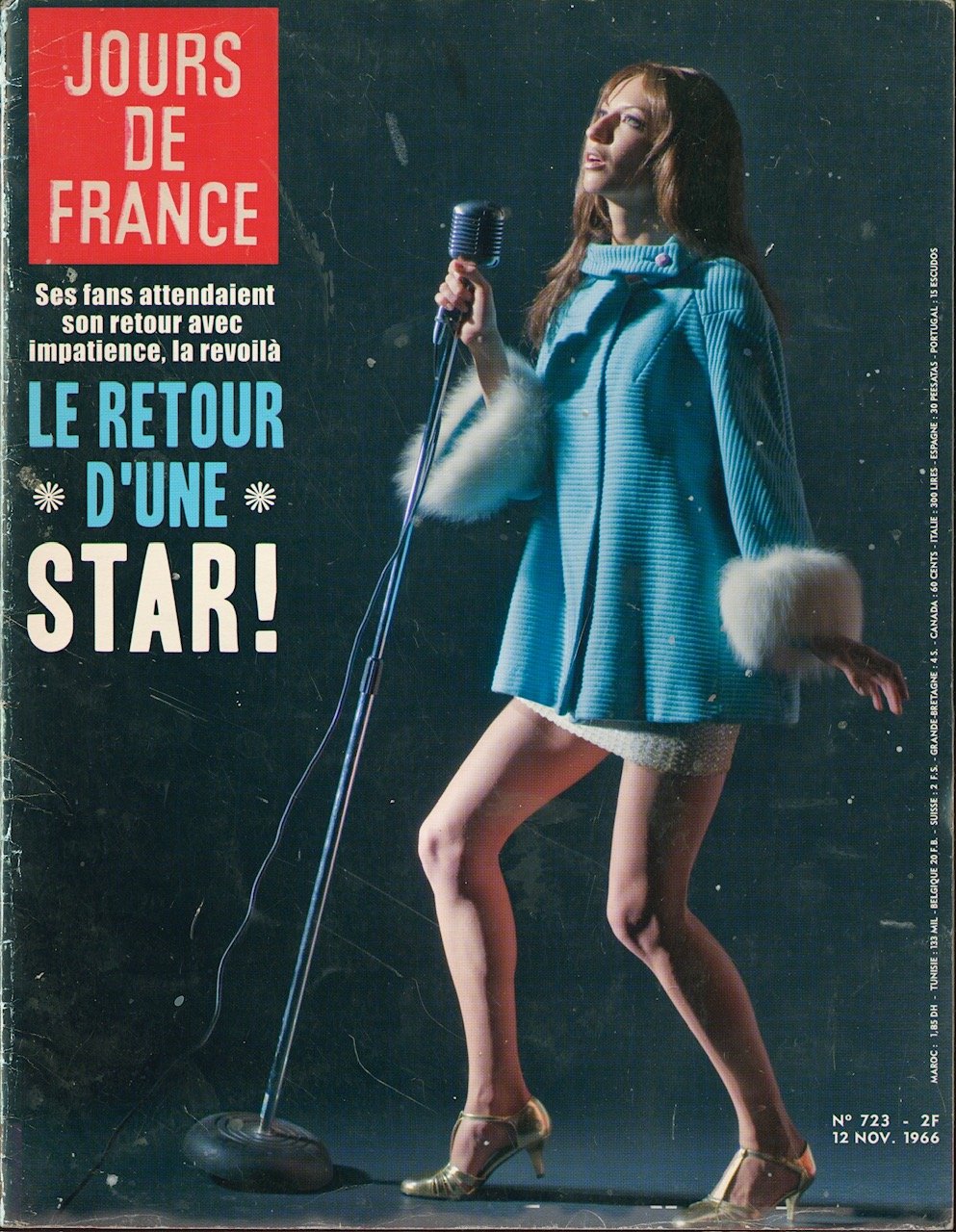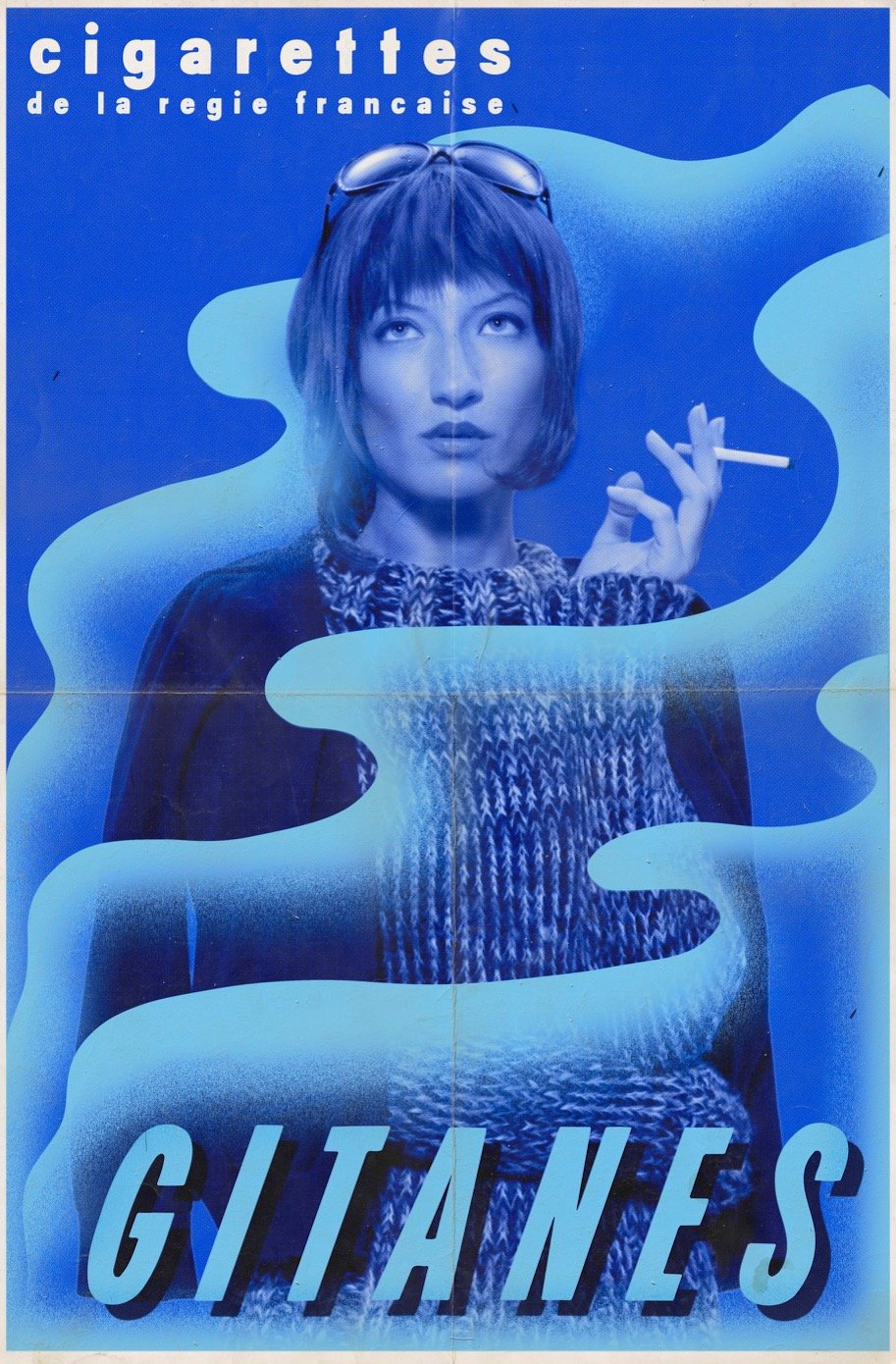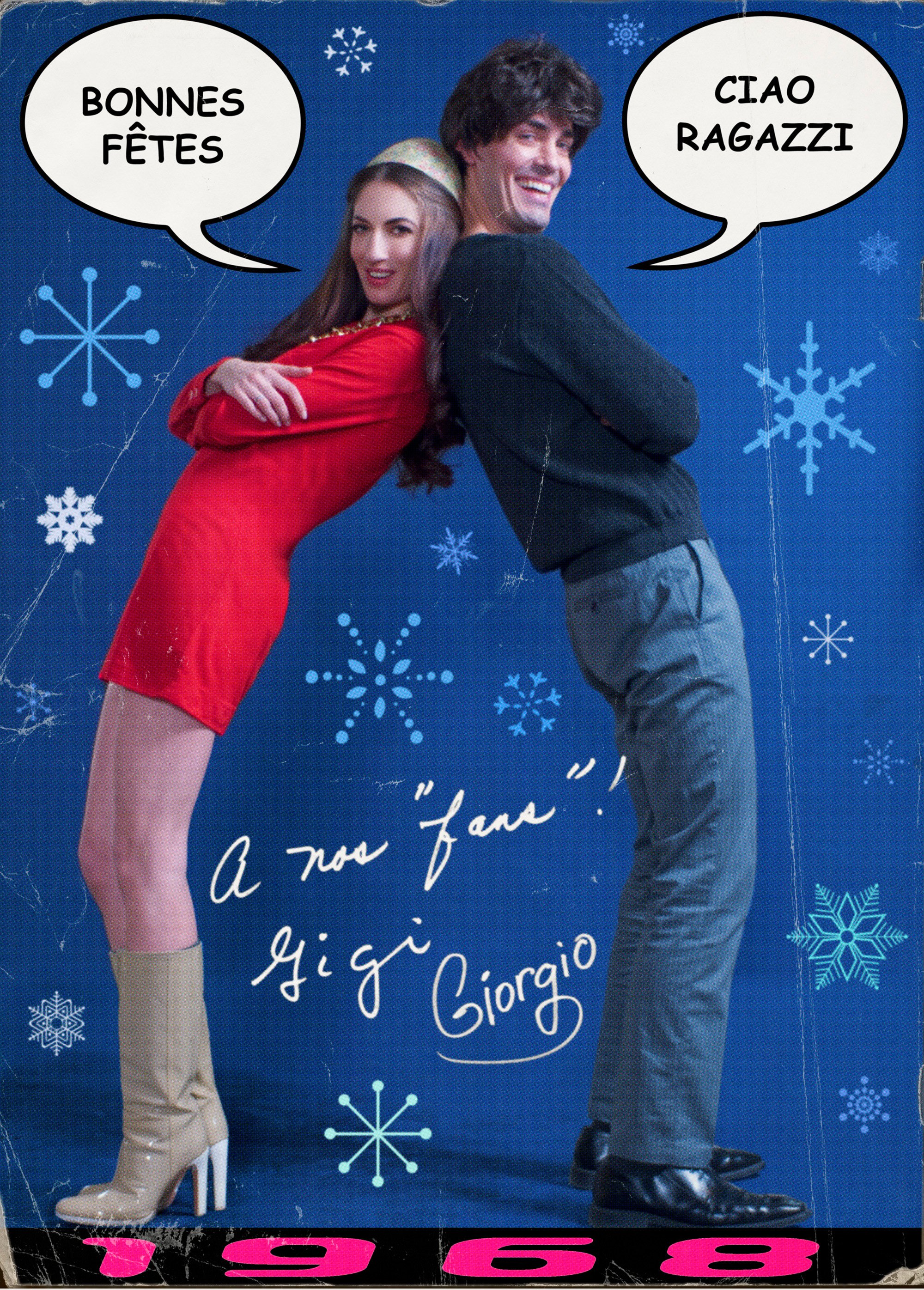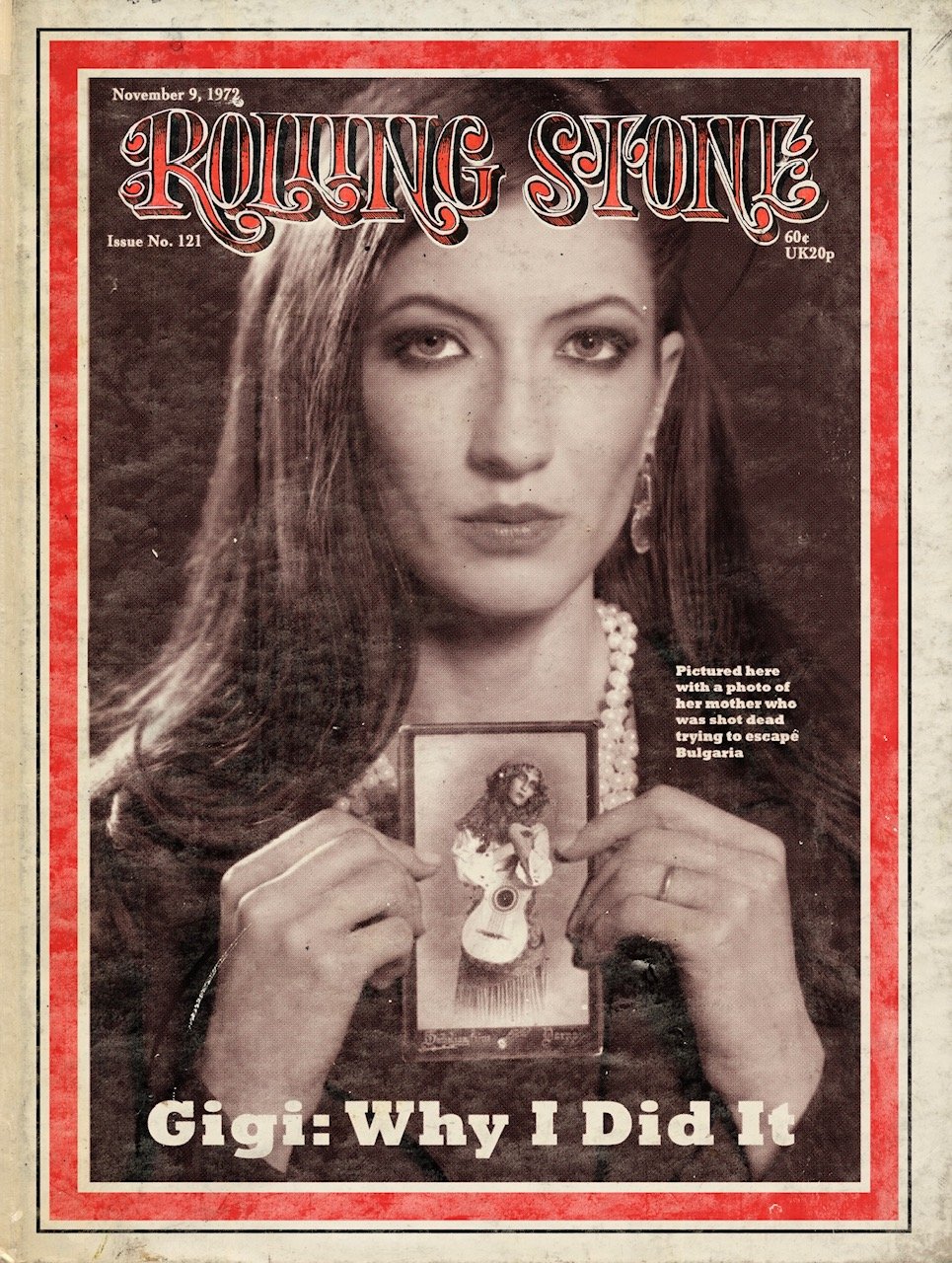Gigi, The Black Flower
“Gosfield’s subject is the entirely fictitious, but utterly believable, Gigi Gaston, a sixties French singing star whose meteoric, scandalous career is described in painstakingly authentic artifacts and museum-style labels quoting everyone from Jean Genet to Janis Joplin. With a pop connoisseur’s attention to period detail, Gosfield concocts a novel by Françoise Sagan, a Harper’s Bazaar cover by Richard Avedon, and a music video by Jean-Luc Godard, complete with publicity stills. Pop history meets fan fantasy, with hilarious results.” — The New Yorker.
“A painstakingly thorough archive of something that never happened.” — Boing Boing
More reviews: ArtNet, The Daily Beast, Wired
The legendary music video Jean-Luc Godard directed for Gigi’s song ‘Je Suis Perdue.’
1943, Bulgaria.“The photo of Milka, Gigi's mother, an itinerant Gypsy musician, was the only keepsake Gigi retained from her Roma youth in Bulgaria. ‘I kept this picture under my bed, but I was trying desperately to fit into a foreign country – so her image haunted me,’ -- Gigi from Famous Gypsies by Jofranka Lyubitshka.
Gergana’s tragic tale. Beginning with her Bulgarian birth in 1943 to her family’s attempted escape from Communist tyranny across the Rhodope Mountains in 1950, when Gigi‘s mother and her older brothers were shot dead by border guards. And on to her delivery, by a stranger, to the front door of the Good Shepherd Orphange in Alsace Lorraine where she was christened as ‘Gigi.’ abused and pressed into forced labor and finally her fateful 1958 meeting with the Gastons, a kindly vacationing family she worked for as an au pair to whom she threatened to kill herself if they did not adopt her, take her home with them to Paris and free her from her life of hell.
1959, Paris : Gigi ’s First guitar. "What I’m most proud of is not that Gigi asked to take our last name Gaston, but that it was in our home that she received her cultural education. Records were always on-- Piaf, Juliette Gréco, Gainsbourg and American Rock. Gigi begged me until I finally gave in and bought her that first guitar.”– Philippe Gaston, Gigi’s adoptive father
Sept. 1962: Gigi and Etienne Gaston's love affair. “What Etienne felt for me was the purest from of love. Maybe it was wrong to reciprocate - as he was in some ways, my brother, but when I look back now, I’ve often wondered what my life would have been like if we had grown old together.” – Gigi from an interview, April 1968
1960-1962: GIGI’S photo album “Etienne really regretted buying that camera, because once he brought it back to the house, I never stopped bothering him to take my picture.” – Gigi, Paris Match
“As a child at the orphanage I had been so busy surviving that I didn’t even know something inside of me was broken. Music! Music is what reawakened within me what had been caged—both pleasure and pain.” - Gigi in a 1965 interview.
Sept. 1961: GIGI’S FIRST 45 “This pretty teenage girl stood in front of our office every day, playing the same five songs over and over to get the attention of anyone who worked here. On my way back from lunch one day, I said, ‘If you swear that you’ll never come back again, I’ll record you.’ When the song, sold two million copies everything changed. The photo on the 45 sleeve is an inside joke, taken in front of our offices where she used to annoy the hell out of us.” – Charles Delaunay, owner and founder of the French record company, Disques Vogue
Feb. 1962: “Gigi released her first song a month after mine. We were exactly the same age and I immediately regarded her as my main competition. Her song ‘Je Suis un Miroir,’ was so dark and lyrically complex. The more I listened the more upset I became. I actually thought about quitting the business. But in the end I could not let her show me up.” – Françoise Hardy, Paris Match
MAY ‘62: “When I first heard the lyrics ‘Forever I shall be a stranger to myself,’ in the song ‘L'Étranger,’ plagiarized from Camus’ book, I bellowed at the radio. But Simone said, ‘Calme-toi Jean-Paul, perhaps this young singer will help Albert sell a few more books.’” - Jean-Paul Sartre
“I was in love with her before I ever met her because I had seen her beautiful face on the cover of hundreds of magazines. Whatever country I was in, there she was and I was quite sure that one day I was going to make her. I just had no idea that one day she was going to become my wife.” – Italian film actor Giorgio Fortuna
“She got so famous so fast that she was no longer my friend Gigi. The public owned her now. ” – Gigi’s best Friend, Manon Lepaire
1962, Gigi paper doll collection “Unlike most women, Gigi wears her clothes. The clothes don’t wear her.” – Yves Saint Laurent
1962, Gigi ’s fan club “The fans are what it’s all about. And of course I love them, but there are time when I just want to be left alone.” – Gigi
Sept. 1962 “What’s in a name? On this latest 45, Gigi, the teenage star, who became so famous so fast, has seen fit to discard her last name, Gaston, like a tattered old dress. So she is just Gigi now - and why not? Her vocal emissions are revolutionary. No teenager has ever sounded so world weary and cool, like a jaded teen queen discarding precious jewels to street beggars.” – Review of ‘Tout Le Monde Pleure,’ Salut de Copains
April 1963 “So many letters have piled into Pop Weekly in the last month demanding that we do another feature on the mysterious Parisian Bird, Gigi, and her latest song, The Monster. I know, I know! I’ve heard you loud and clear! You’ve flipped out over this French Swallow and bought her records by the millions - so, get your hot little hands on this week’s cover story in which I will tell you some startling secrets about her that will shock you silly!” – The Editor Speaks Column, Pop Weekly
1962: “In a single song, this teenage singer has expressed the sorrow of a nation more eloquently than the pens of 1,000 writers.” - Charles de Gaulle On hearing Gigi’s ‘Le Monstre‘
July 1962 “It was the stunning, elliptical, off-center, sorrowful beauty of Gigi in Godard’s music video that inspired in me the idea of making a musical based on a tragic love story” - Jacques Demy on the making of ‘The Umbrellas of Cherbourg’
July 1962: Film Still “Gigi had one the saddest faces I’ve ever filmed, like a freeze frame the moment before the heroine realizes she’s going to die” – Jean Luc Godard on directing Gigi’s music video
May 1964: GIGI’s first LP “No one thought the French were capable of anything but their sad and self conscious chansons - but at the age of 16 when I first heard Gigi’s ‘Je Suis Eve’ it was love at first sound” -- David Bowie on his musical infatuation with Gigi
FEB. 1964, London “George really fancied Gigi, so I wrote a song about her called 'And Your Bird Can Sing.' Who knows? It might even turn up on an album one day”– John Lennon
MAY 1964: “The evening began in triumph with Gigi’s concert at the Olympia, the oldest and most famed music hall in France, where her heroine Edith Piaf had often performed. The only disappointment was that Gigi’s somewhat sickly lover Etienne had skipped the concert because of a severe flu and had remained at the family’s country home. As Gigi performed to a sold out and wildly enthusiastic crowd, Etienne dragged himself out of his sickbed and raced to meet her. Happily exhausted at the end of the night, Gigi stood in her dressing room, surrounded by admirers, autograph seekers and bouquets of flowers as a feverish Etienne, behind the wheel in a pouring rain, lost control of the car on a hairpin turn of the RN6, shot through a barrier, flew off the side of the road and crashed fatally into a bank of trees.” – Noir et Blanc Magazine
De. 22, 1963: Etienne's Funeral. The photo of Gig clutching Black Roses that would forevermore define her. “Is not that we ever blamed Gigi for the death of our dear son Etienne, but we could no longer bear to see her, for she reminded us of all we had lost. And then, because of our heartlessness we lost Gigi too.” - Philippe Gaston, Gigi’s adoptive father
June,1964: "NIGHTMARE: Like a trapped animal, Gigi is caught in the harsh flash of one of the many devious lensmen who camp outside of her Parisian home 24 hours a day."
1964 FAN ART “Dearest Gigi, Please ignore all those annoying articles about you in the paper and know that there are many out here just like me that send you all our love in this trying time. Your biggest fan, Isabelle Adjani” – One of the thousands of pieces of fan mail sent to Gigi
Feb. 1965: "Françoise Sagan’s best-selling novel ‘The Black Flower,’ was based on Gigi’s life. Gigi would forever be associated with the tragic nickname ‘The Black Flower..’ The novel was considered a return to form for Sagan whose recent work had been met with critical indifference. Predating Truman Capote’s ‘In Cold Blood’ by more than a year, the work was one of the first examples of the “non-fiction novel” in which the lines between fiction and non-fiction are blurred.” – Masterpieces of French Literature by Manon Volaire
May 1966: "Gigi and Giorgio? The Secret Love Exposed! Can the Italian Movie Star, Giorgio Fortuna mend our Black Flower’s broken heart?"
July 1966 “Giorgio, if you leave me you will never see you son again!” – Giorgio’s estranged wife, Rosanna Fortuna
July 1966: “I rented a cottage one kilometer from Giorgio’s private beachside villa. I slid down a rocky grotto, hid behind a stone pillar, smoked cigarettes and waited. When Giorgio and Gigi finally emerged I had my Leica M3 and 135mm lens ready. As I snapped, I suspected the lovers were aware that I was there and they were performing for me. After two hours or so, they waved at me and went back inside.” - Elio Sorci, one of the original paparazzi.
August 1966: “A star, a death and a love triangle are the staples of a gossip magazine. Gigi was an editor’s dream. Every couple of years there was a new wrinkle in her life that was guaranteed to sell magazines. They don’t make them like her anymore.” – Charles Frothington, editor of Inside Story Magazine
Sept. 1966: "Why I Love Girogio. Love is not simple, love is not blind,’ said Gigi when we asked her exactly what it was that she loved about Giorgio. ‘It’s not as if when you find a lover your past is erased, but now there is room for more than pain.’ ” – Gigi, Mademoiselle Age Tendre Magazine
Nov. 1966: “for Gigi / and the cigarette hangin / from her lip / bread not eaten / and left bank / sleepin on the seine’s edge / but not sad yet / she rides along / on that voice / floatin like wind…” - written for Gigi by Bob Dylan (who became obsessed with her after hearing this album)
Nov. 1966: "RETURN OF A STAR. Her multitudes of fans will rejoice that time and love have healed The Black Flower’s wounds. She’s BACK!” – Jour de France
Jan. 1967 “I didn’t think of it as a dramatic comeback. It's just that after I met Giorgio I wanted to play music again. But the magazines need a story line and sometimes it’s just easier to play along.” – Gigi, Fabulous Magazine
SEPT. 1967: “At the orphanage, the French kids spat on me and called me 'dirty gypsy.' It took me a long time to accept who I am and where I came from. This album is an homage to everything I lost; my home, my culture and my mother.” – Gigi’s liner notes to the album, The Gypsy
Nov. 1968: “I despised Gigi because I sent her songs perfectly tailored to her brooding persona - and she never recorded a single one! When I heard the brilliant songs she wrote for La Fleur Noire I finally understood why she didn’t need me.” – Serge Gainsbourg, Paris Match
SEPT 1967 “Gigi was the world's cheapest model - you only had to shoot half a roll of film and then you had it” -- Richard Avedon on shooting Gigi for a Harper’s Bazaar Cover
Nov. 1968: Gitanes Ad Campaign “I was trying to quit smoking when I saw Gigi’s advert in the Paris Metro. Standing there, so cool with a fag dangling from her hand, I wanted to bang her, but instead I reached into Mick’s pocket, slipped out a smoke and lit up. Didn’t bother trying to quit for another twenty years.” – Keith Richards interview
Dec. 1968 “Giorgio was still married and legally entangled with his Italian wife, but we decided why not, and sent out this holiday card to our friends and fans.” – Gigi, Jours de France
Jan. 1969: “Kris Kristofferson and I met her backstage after her amazing show at the Fillmore East and over a bottle of pernod she told us in her sexy French accent that she’d 'trade all her tomorrows for a single yesterday,' and damn if Kris didn't steal that line for 'Me and Bobby McGee.'"– Janis Joplin
Feb, 1969: London “Right the middle of the gig, Gigi caved to the floor like she’d been shot. When we found out why she fainted, sure, I was happy she was going to get the kid that she wanted, but all of a sudden it was the end of my dream of playing with her.” – Lucky Oceans, Gigi’s guitarist
MAY 1969 “No one expected the beautiful songbird to be a virgin, so it came as no surprise when the stork came to pay a visit. Giorgio, who has been called a callous cad, used his movie star connections to get an annulment from the Catholic Church and gallantly came to her rescue.” – Photoplay
May 1969 “There is a certain age when a woman must be beautiful to be loved, and then there comes a time when she must be loved to be beautiful.” – Françoise Sagan on Gigi, Paris Match
“I am the happiest woman alive. If only my mother were here to hold her grandson in her arms.” - Gigi
Jan 1970, “Parents are the very last people who ought to be allowed to have children and mine were no exception.” – Giacomo Fortuna, son of Gigi and Giorgio in a 1999 interview
Oct. 1971: “That Lothario Giorgio has been seen escorting various beauties all over the continent. Our advice to Gigi: To catch a husband is an art but to hold him is a job.” – Photoplay Magazine
Jan. 1972: “In a jealous rage, Gigi commits the ultimate crime” – France Dimanche
Nov. 1972: “Seeing Gigi stride arrogantly into court, I recognized in her, as in all the other thieves, traitors and murderers, a ruthless and cunning beauty.” - Jean Genet on Gigi’s trial
Dec. 1972: “Jealousy is not contemptible -- real love has a beak and claws. Gigi did what she had to do.” - Simone de Beauvoir on Gigi
Nov. 1972 “Gigi has launched an unseemly propaganda campaign in the press to convince the public of her innocence. This sort of crass appeal to the masses has no place in the modern day justice system.” - Editorial in Le Monde
Dec. 1972: “Murder is the most ugly and tasteless deed, that is unless it’s committed in the name of love.” - Norman Mailer on Gigi’s trial, Esquire.
March 1973: “Gone. She’s gone. Gone like nobody has a god damned clue of where she’s been for the last 30 years. The greatest disappearing act in pop music history.” – Graffiti on a mural of Gigi in Paris, 2000
